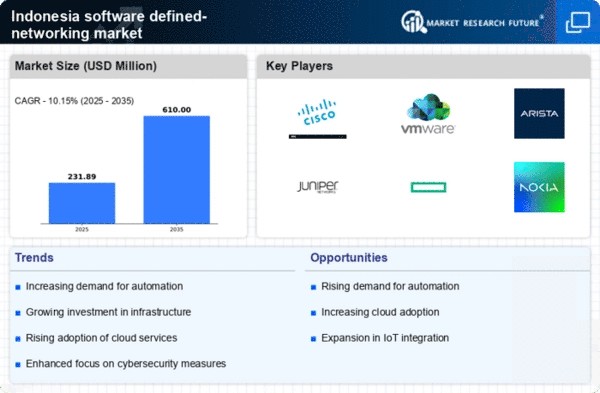Emergence of 5G Technology
The emergence of 5G technology in Indonesia is poised to have a transformative impact on the software defined-networking market. With the rollout of 5G networks, there is an increasing demand for advanced networking solutions that can handle higher data speeds and lower latency. Software defined-networking technologies are well-suited to leverage the capabilities of 5G, enabling organizations to optimize their network performance and enhance user experiences. This trend is expected to drive significant investments in software defined-networking solutions, as businesses seek to capitalize on the benefits of 5G connectivity. The software defined-networking market is projected to grow by approximately 25% as organizations adapt to the new technological landscape and explore innovative applications enabled by 5G.
Rising Demand for Network Agility
The software defined-networking market in Indonesia is experiencing a notable surge in demand for network agility. Organizations are increasingly seeking solutions that allow for rapid adjustments to network configurations, enabling them to respond swiftly to changing business needs. This demand is driven by the necessity for enhanced operational efficiency and the ability to support diverse applications. As a result, the market is projected to grow at a CAGR of approximately 20% over the next five years. Companies are investing in software defined-networking technologies to streamline their operations, reduce downtime, and improve overall service delivery. The emphasis on agility is reshaping the competitive landscape, compelling service providers to innovate and offer more flexible solutions to meet customer expectations.
Increased Focus on Cost Efficiency
Cost efficiency remains a critical driver for the software defined-networking market in Indonesia. Organizations are increasingly looking for ways to optimize their IT expenditures while maintaining high levels of performance and reliability. Software defined-networking solutions provide the flexibility to manage resources more effectively, reducing the need for extensive hardware investments. This shift towards software-based solutions is expected to lead to a reduction in operational costs by up to 30% for many businesses. As companies seek to streamline their operations and improve their bottom line, the software defined-networking market is likely to benefit from this focus on cost efficiency, with a projected growth rate of 12% in the coming years.
Shift Towards Remote Work Solutions
The shift towards remote work in Indonesia is creating new opportunities for the software defined-networking market. As businesses adapt to flexible work arrangements, there is a growing need for secure and efficient networking solutions that can support remote access. Software defined-networking technologies offer the scalability and security required to facilitate remote work, allowing employees to connect seamlessly to corporate networks from various locations. This trend is likely to drive market growth, with an expected increase in demand for virtual private networks (VPNs) and secure access service edge (SASE) solutions. The software defined-networking market is projected to expand by approximately 18% as organizations prioritize remote work capabilities and invest in the necessary infrastructure.
Government Initiatives for Digital Transformation
In Indonesia, government initiatives aimed at promoting digital transformation are significantly influencing the software defined-networking market. The government has launched various programs to enhance the country's digital infrastructure, which includes investments in advanced networking technologies. These initiatives are expected to drive the adoption of software defined-networking solutions across various sectors, including education, healthcare, and finance. The government's commitment to fostering a digital economy is likely to result in increased funding and support for technology adoption, thereby propelling market growth. As organizations align with these initiatives, the software defined-networking market is anticipated to witness a robust expansion, with an estimated growth rate of 15% over the next few years.
















